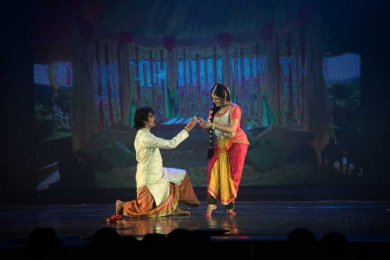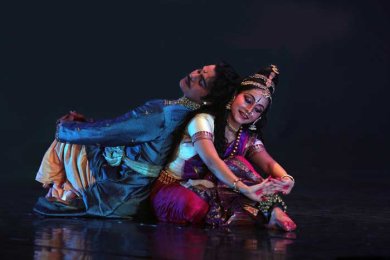
|   |

|   |
Ilango’s epic poem comes alive on stage - G.Ulaganathan e-mail: ulag_nath@yahoo.com Photos” BV Suresh October 28, 2016 It was a grand dance ballet, like an opera, rarely seen these days. Ilango Adigal’s epic poem Cilappathikaram has been made into a gripping dance drama by the eminent Kuchipudi guru in Bangalore, Veena Murthy Vijay. It was staged in Chowdaiah hall in Bangalore and was presented by BCKA (Bangalore Club for Kathakali and the Arts). This two-hour production comes in Sanskrit with English narration and interestingly, though it is based on the Tamil epic, there is hardly any Tamil song. “This is based on the Malayalam translation of Ilango Adigal’s work by the well-known Malayalam scholar Narayana Panickar. His daughter Meena Das Narayan has translated it into English. I have taken these English lyrics and choreographed this work in opera style,” says Veena. The dance drama is in three acts. The first act shows the happy married life of Kovalan and Kannagi, in the port city of Poompuhar, the second act begins with the grand entry of Madhavi and her relationship with Kovalan and the third act takes us to the court of Neduncheliyan, the Pandya king. The king of Madurai, by a great error of judgement, puts Kovalan to death as he was accused of stealing the Queen’s anklet. The grand finale is Kannagi burning the entire city of Madurai and herself attaining the status of a goddess in Tamil kingdom. 

Praveen Rao’s captivating music and imaginative direction, with the help of appropriate props and lighting were the highlights of this grand spectacle. The main cast consisted of three very talented young classical dancers—Mithun Shyam, himself a well-known dancer /teacher in Bangalore in the role of Kovalan, the graceful dancer Divya Ravi as Kannagi and the pretty, Kuchipudi dancer Prateeksha Kashi in the role of Madhavi. The entry of courtesan Madhavi was the highlight of the production as she is known to be well versed in all styles of dances. So, in the court of Neduncheliyan, she charms Kovalan with her artistry in Bharatanatyam, Kathak, Kuchipudi, Mohiniattam and Odissi. Totally bowled over by her charm and talent, Kovalan starts living with her, forgetting his wife Kannagi. Brilliant dancer Prateeksha has been trained by her equally talented guru/mother dancer Vyjayanthi Kashi in Kuchipudi and Bharatanatyam. She has also learnt the other styles for this production and executed them with ease, quickly changing costumes. It was almost a switch-on, switch-off moment for her and swept the audience off their feet. Equally brilliant was Divya in the role of Kannnagi and she dominated the show in the last few scenes culminating in her angry reaction to her husband’s unjust killing. The dance drama also had many young dancers from the city in various roles and there was perfect synchronisation.  Veena, very imaginatively, told the entire tale through the Anklet which is a witness to the history being made. What was unconvincing was the script. According to the original story written by Ilango Adigal, when Kannagi proves her husband’s innocence in the court, the king Neduncheliyan and his queen Kopperundevi give up their own lives in the Raja sabha itself which probably led to the adage, ‘Justice delayed is justice denied.’ But in this production, it was appalling to see the king casually walk away from the stage after Kannagi proves him wrong and only orders the slaying of the goldsmith who gave the wrong information. Also there was no convincing reason given for Kovalan to leave Madhavi after a brief dalliance. It was obvious that certain liberties have been taken with the original poetic work which cannot be justified as Cilppathikaram is very much part of academic studies in schools and colleges all over Tamil Nadu. Hopefully, when it is staged next time, the director and choreographer will stick to the original tale if they want to retain the title ‘Cilappathikaram’ and attribute it to Ilango Adigal. G. Ulaganathan is a senior writer and journalist based in Bangalore. |